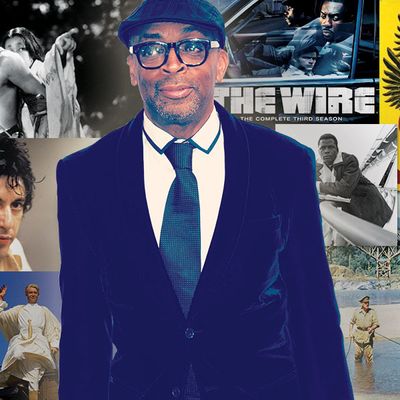
Beginning Friday, Spike Lee’s crowd-funded love story about immortal blood addicts, Da Sweet Blood of Jesus, unspools in select theaters. Lee, who wrote, produced, and directed the film, spoke with Vulture about the movies, books, and people that have influenced his latest joint, as well as his career as a whole.
The Autobiography of Malcolm X: As Told to Alex Haley
Every year, I go back and reread The Autobiography of Malcolm X: As Told to Alex Haley. I was in seventh or eighth grade in Rothschild Junior High School in Fort Greene, Brooklyn, New York — we had to read that, and that book changed my life. At that time, I had no idea what I wanted to do, let alone be a filmmaker. But I was blessed to get to do [Malcolm X] with the great, great Denzel Washington, who gave one of the greatest performances of all time. So I always go back to that book. It’s the odyssey of who we are as a people in this country.
Akira Kurosawa’s Rashomon
She’s Gotta Have It was inspired by Kurosawa’s Rashomon. The whole story of Rashomon, where a rape and murder is committed, and you get witnesses — everybody gives their own version of what happened, and the audience is left to make up their mind. Well, that’s the same thing in She’s Gotta Have It, where you have these three men who are in love with Nola Darling, and they’re giving their version of Nola. I recently bought the Criterion collection Blu-ray, but I haven’t had a chance to look at it yet.
David Lean
If you look at Malcolm X, Ernest Dickerson — my NYU classmate and the great cinematographer — and I, we were looking at the great epics of David Lean: The Bridge on the River Kwai, Doctor Zhivago, Lawrence of Arabia. That trilogy. David Lean was the master of the epic film, and that’s what Ernest Dickerson, Denzel, and I wanted to do with Malcolm X, we wanted to make an epic film.
Sidney Lumet’s Dog Day Afternoon
It’s a different kind of bank robbery, but it really showed New York City, and it’s a great film. We paid homage to Sidney Lumet. I forget the actress’s name [Editor’s note: It was Marcia Jean Kurtz] — please forgive me — but one of the hostages in Dog Day Afternoon is also a hostage in Inside Man. She’s the one who refuses to take off her clothes when Clive Owen is telling her to take off her clothes. We also found the guy that delivered pizza to Al Pacino and had him deliver pizza to the hostages in Inside Man [laughs]. And then if you look at Inside Man, the pizza is from Sal’s Famous Pizzeria [laughs].
The Wire
I’m a big fan of The Wire; it’s epic, you know. Five years, great storytelling, the whole package was very complex.
Toni Morrison’s Song of Solomon and August Wilson
[Solomon] is one of the greatest books of all time. For me, it’s very simple: It’s all Toni’s storytelling. Also, the work of August Wilson: Fences and that whole Century Cycle series. I love August Wilson. His storytelling, his language [laughs]. I just love stories. I don’t have a definition for what makes a good story, I just know it when I read it or see it.
Sidney Poitier
I’ve never had the honor to work with him. Hopefully it’s not too late. He was the image of the black man. Sidney was groundbreaking, doing stuff that had not been done — we had not seen the image of a strong black man in film. Not in Hollywood films. In the Heat of the Night — you know, a black man doing what he did down in Mississippi in that time? It’s crazy.
Richard Pryor
He was funny. He was fun-ny.
Bill Gunn’s Ganja & Hess
[Da Sweet Blood of Jesus] is the reimagining of that film, that great cult classic, written and directed by Bill Gunn, which I saw while I was at NYU’s graduate film school. That’s the source of this film. I knew I was going to raise some money on Kickstarter, God willing, and I knew the ballpark figure of the budget we’d be able to get. I began thinking and thinking and thinking, and I was directed toward Ganja & Hess. I’m trying to pay homage to Bill Gunn, so he’s the only person I have in mind for this film.

